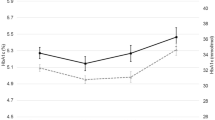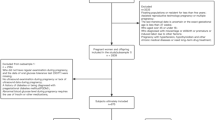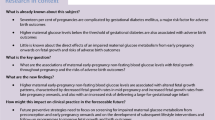Abstract
Aim
We aimed to evaluated if fetuses of subjects with one elevated value on the 3-h GTT had a measurable physiologic difference in fetal C-peptide levels as compared to those with no elevated values on the GTT.
Methods
We performed a prospective cohort study to evaluate insulin levels in singleton non-anomalous fetuses of subjects with one elevated value on the GTT as compared to subjects with no elevated values on their GTT. Fetal insulin levels were measured by fetal C-peptide in cord blood. Distribution of data was assessed and outliers representing values > the 99th and < the 1st percentiles were excluded. Data were log transformed to achieve normal distribution and univariable analyses were performed to compare fetal C-peptide levels, baseline maternal characteristics and perinatal outcomes in subjects with one elevated value as compared those with no elevated values.
Results
Our analysis included 99 subjects, with 49 subjects in the one elevated value group and 50 subjects in the no elevated values group. Fetal C-peptide levels (picomoles per liters, pmol/L), were significantly higher in the elevated value group as compared to the no elevated value group (mean ± SD; 4.6 ± 0.8 vs. 4.3 ± 0.7, P = 0.046, respectively). In univariable analysis, there was no significant difference in maternal characteristics or adverse composite perinatal outcomes.
Conclusion
Fetuses of subjects who had one elevated value on their GTT had a measurable physiologic difference in C-peptide levels as compared to fetuses of subjects with no elevated values on the GTT.
Similar content being viewed by others
References
Correa A, Bardenheier B, Elixhauser A, Geiss LS, Gregg E (2015) Trends in prevalence of diabetes among delivery hospitalizations, United States, 1993–2009. Matern Child Health J 19(3):635–642. https://doi.org/10.1007/s10995-014-1553-5
Zhu Y, Hedderson MM, Quesenberry CP, Feng J, Ferrara A (2018) Central obesity increases the risk of gestational diabetes partially through increasing insulin resistance. Obesity. https://doi.org/10.1002/oby.22339
American Diabetes Association (2004) Gestational diabetes mellitus. Diabetes Care 27(Suppl 1):S88-90
Chu SY, Callaghan WM, Kim SY et al (2007) Maternal obesity and risk of gestational diabetes mellitus. Diabetes Care 30(8):2070–2076. https://doi.org/10.2337/dc06-2559a
Thorpe LE, Berger D, Ellis JA et al (2005) Trends and racial/ethnic disparities in gestational diabetes among pregnant women in New York City, 1990–2001. Am J Public Health. https://doi.org/10.2105/AJPH.2005.066100
ACOG Practice Bulletin No (2018) 190: gestational diabetes mellitus. Obstet Gynecol. https://doi.org/10.1097/AOG.0000000000002501
Crowther CA, Hiller JE, Moss JR et al (2005) Effect of treatment of gestational diabetes mellitus on pregnancy outcomes. N Engl J Med 352(24):2477–2486. https://doi.org/10.1056/NEJMoa042973
Landon MB, Spong CY, Thom E et al (2009) A multicenter, randomized trial of treatment for mild gestational diabetes. N Engl J Med 361(14):1339–1348. https://doi.org/10.1056/NEJMoa0902430
Langer O, Brustman L, Anyaegbunam A, Mazze R (1987) The significance of one abnormal glucose tolerance test value on adverse outcome in pregnancy. Am J Obstet Gynecol. https://doi.org/10.1016/S0002-9378(87)80045-5
Lindsay MK, Graves W, Klein L (1989) The relationship of one abnormal glucose tolerance test value and pregnancy complications. Obstetr Gynecol. https://doi.org/10.1080/17460650601002446
Langer O, Anyaegbunam A, Brustman L, Divon M (1989) Management of women with one abnormal oral glucose tolerance test value reduces adverse outcome in pregnancy. Am J Obstet Gynecol 161(3):593–599
McLaughlin GB, Cheng YW, Caughey AB (2006) Women with one elevated 3-hour glucose tolerance test value: Are they at risk for adverse perinatal outcomes? Am J Obstet Gynecol. https://doi.org/10.1016/j.ajog.2006.01.028
Berkus MD, Langer O (1993) Glucose tolerance test: degree of glucose abnormality correlates with neonatal outcome. Obstet Gynecol 81(3):344–348
Lowe LP, Metzger BE, Dyer AR, et al. (2010) Hyperglycemia and adverse pregnancy outcome (HAPO) study: an overview. In: Gestational diabetes during and after pregnancy. https://doi.org/10.1007/978-1-84882-120-0_2
O’Rahilly S, Burnett MA, Smith RF, Darley JH, Turner RC (1987) Haemolysis affects insulin but not C-peptide immunoassay. Diabetologia. https://doi.org/10.1007/BF00292540
Saber AM, Mohamed MA, Sadek AA, Mahmoud RA (2021) Role of umbilical cord C-peptide levels in early prediction of hypoglycemia in infants of diabetic mothers. BMC Pediatr 21(1):85. https://doi.org/10.1186/s12887-021-02547-w
Cheng YW, Block-Kurbisch I, Caughey AB (2009) Carpenter-coustan criteria compared with the national diabetes data group thresholds for gestational diabetes mellitus. Obstet Gynecol. https://doi.org/10.1097/AOG.0b013e3181ae8d85
West RM (2021) Best practice in statistics: the use of log transformation. Ann Clin Biochem. https://doi.org/10.1177/00045632211050531
Ergin T, Lembet A, Duran H et al (2002) Does insulin secretion in patients with one abnormal glucose tolerance test value mimic gestational diabetes mellitus? Am J Obstet Gynecol. https://doi.org/10.1067/mob.2002.119634
Roeckner JT, Sanchez-Ramos L, Jijon-Knupp R, Kaunitz AM (2016) Single abnormal value on 3-hour oral glucose tolerance test during pregnancy is associated with adverse maternal and neonatal outcomes: a systematic review and metaanalysis. Am J Obstet Gynecol. https://doi.org/10.1016/j.ajog.2016.04.040
Mears K, Mcauliffe F, Grimes H, Morrison JJ (2004) Fetal cortisol in relation to labour, intrapartum events and mode of delivery. J Obstet Gynaecol (Lahore). https://doi.org/10.1080/01443610410001645389
Vogl SE, Worda C, Egarter C et al (2006) Mode of delivery is associated with maternal and fetal endocrine stress response. BJOG. https://doi.org/10.1111/j.1471-0528.2006.00865.x
Funding
This study was funded by the Women’s Board of the University of Chicago and by the University of Chicago Institute for medicine Pilot Translational and Clinical Studies Award for Short-term Studies. This study was a poster presentation at the Society for Maternal Fetal Medicine Annual meeting (January 31-Febuary 5th, 2022).
Author information
Authors and Affiliations
Corresponding author
Ethics declarations
Conflict of interest
The authors report no conflict of interests.
Ethical standards statement
This study was compliant with ethical standards as approved by the Institutional Review Board and the Declaration of Helsinki and amendments
Additional information
Managed By Massimo Federici.
Publisher's Note
Springer Nature remains neutral with regard to jurisdictional claims in published maps and institutional affiliations.
Rights and permissions
Springer Nature or its licensor (e.g. a society or other partner) holds exclusive rights to this article under a publishing agreement with the author(s) or other rightsholder(s); author self-archiving of the accepted manuscript version of this article is solely governed by the terms of such publishing agreement and applicable law.
About this article
Cite this article
de Los Reyes, S., Dude, A., Doll, J. et al. The association between a single abnormal glucose and fetal c-peptide. Acta Diabetol 60, 1359–1363 (2023). https://doi.org/10.1007/s00592-023-02123-x
Received:
Accepted:
Published:
Issue Date:
DOI: https://doi.org/10.1007/s00592-023-02123-x




